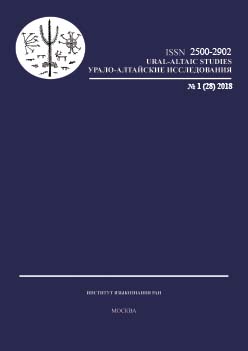Кодирование участников при двухместных предикатах в лесном диалекте энецкого языка
Encoding of two-place predicates’ arguments in Forest Enets
Author(s): Maja OvsjannikovováSubject(s): Language studies, Language and Literature Studies, Sociolinguistics, Finno-Ugrian studies
Published by: Институт языкознания Российской академии наук
Keywords: Enets; Samoyedic languages; two-place predicates; transitivity; variation in participant encoding; Stimulus; comitative construction; Possessor;
Summary/Abstract: The paper examines the valency classes of two-place predicates in Forest Enets. The data were gathered using a questionnaire aimed at the typological study of encoding of two-participant events as well as from the corpus of texts in Forest Enets. The questionnaire data show that some of the events that tend to be encoded intransitively in other languages of Northern Eurasia are encoded with transitive verbs in Enets, e. g. ‘be afraid’, ‘help’. Intransitivity in Enets is also associated with imperfectivity of the verb and inanimacy of the object participant. Two types of variation were studied using the data from the texts. First, the Stimulus of experiential verbs and the Addressee of speech verbs can be encoded either by the dative case or by the postposition dʲez ‘in the direction’. Second, the Companion participant can be encoded either by the locative case or by the postposition nɔʔ ‘with’. In both cases, pronominal participant are predominantly case-marked, while noun phrases allow for freer variation between case and postposition. The choice of encoding is also associated with the type of the verb. The postposition dʲez ‘in the direction’ is the favoured means of encoding for the Stimulus of perception verbs, whereas with speech verbs it is used only marginally. Of the two means with comitative meaning, the locative case tends to encode Companion participants that are obligatorily present in the event denoted by the verb (symmetric verbs), and the postposition nɔʔ ‘with’ is used otherwise. Finally, non-subject encoding of Experiencers and Possessors is discussed.
Journal: Урало-алтайские исследования
- Issue Year: 2018
- Issue No: 01 (28)
- Page Range: 49-68
- Page Count: 20
- Language: Russian

